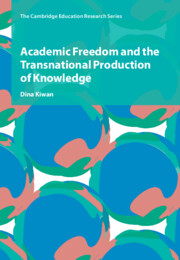Book contents
- Academic Freedom and the Transnational Production of Knowledge
- Reviews
- Academic Freedom and the Transnational Production of Knowledge
- Copyright page
- Dedication
- Contents
- Foreword
- Preface
- Acknowledgements
- 1 Introduction
- 2 Constructions of Academic Freedom
- 3 Constructions of Knowledge
- 4 Producing Knowledge
- 5 Challenging Knowledge
- 6 ‘Forbidden’ Knowledge
- 7 ‘Legitimate’ Knowledge
- 8 Conclusion
- References
- Index
8 - Conclusion
A Transnational Theory of Academic Freedom and the Production of Inclusive Knowledge
Published online by Cambridge University Press: 04 January 2024
- Academic Freedom and the Transnational Production of Knowledge
- Reviews
- Academic Freedom and the Transnational Production of Knowledge
- Copyright page
- Dedication
- Contents
- Foreword
- Preface
- Acknowledgements
- 1 Introduction
- 2 Constructions of Academic Freedom
- 3 Constructions of Knowledge
- 4 Producing Knowledge
- 5 Challenging Knowledge
- 6 ‘Forbidden’ Knowledge
- 7 ‘Legitimate’ Knowledge
- 8 Conclusion
- References
- Index
Summary
This chapter draws together the findings to argue for a transnational theory of academic freedom and the production of knowledge. Based on original empirical data from Lebanon, the UAE, the United Kingdom, and the United States, I argue for the necessity of taking account of the complexities of globalisation, internationalisation, and geographical and historical inter-connectivities, as well as the particularities of context. I argue that the construct of academic freedom is premised on inclusivity, rather than the principles of academic freedom being construed as in tension with the principles of diversity and inclusion. This argument is developed from the recognition of the positionality of the knowledge producer, thereby positioning knowledge as relational, contextualised, and within the politics of power relations. Methodological conclusions consolidate arguments for a move away from the methodological nationalism underpinning the study of academic freedom and for its transnational framing in theorising the relationship between academic freedom and the production of knowledge.
- Type
- Chapter
- Information
- Academic Freedom and the Transnational Production of Knowledge , pp. 159 - 178Publisher: Cambridge University PressPrint publication year: 2024



